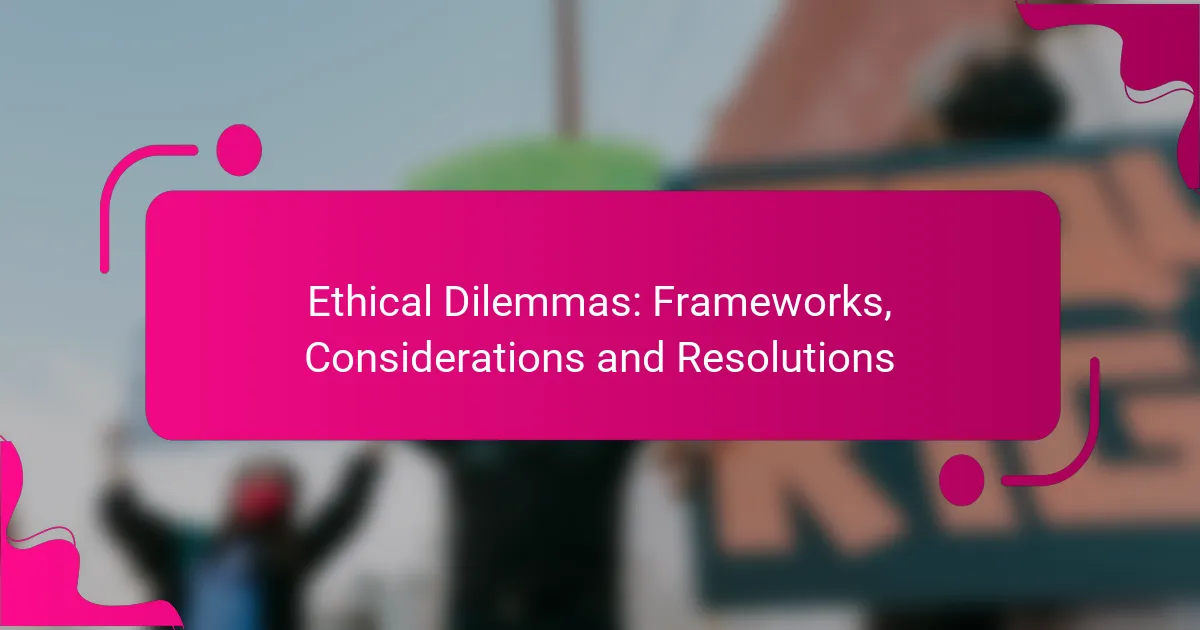Ethical dilemmas frequently arise in both personal and professional contexts, challenging individuals to navigate complex moral landscapes. By employing key ethical frameworks, one can systematically evaluate the implications of their choices, ensuring that decisions align with core values while considering the well-being of all stakeholders involved. Understanding these frameworks is essential for effectively resolving conflicts and making principled decisions in the face of competing interests.
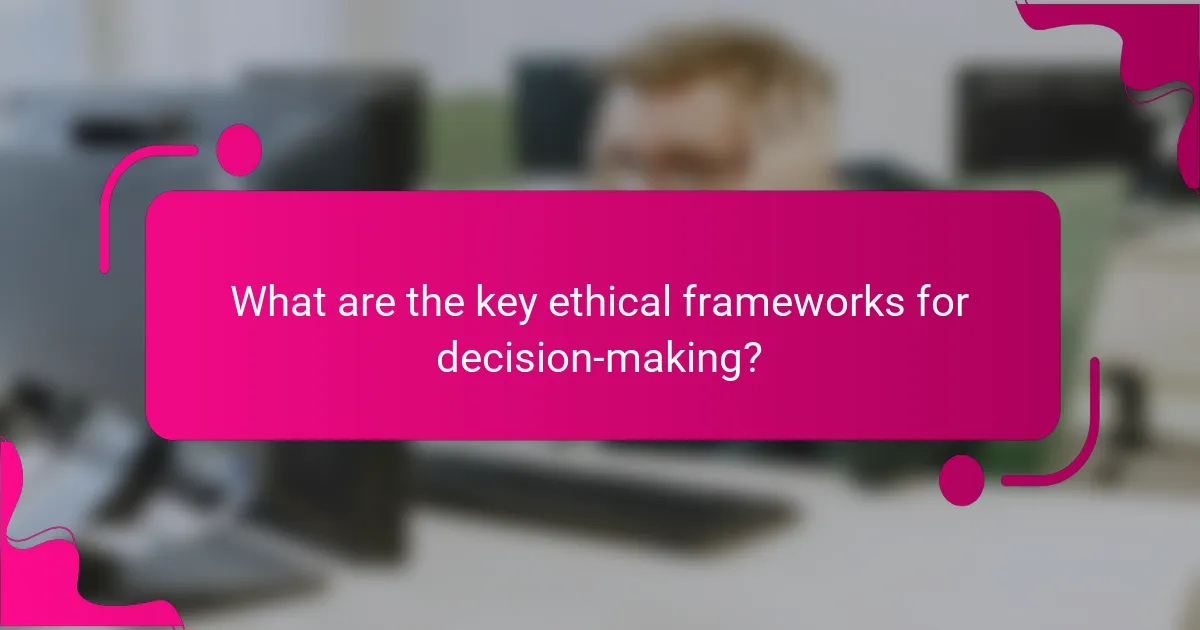
What are the key ethical frameworks for decision-making?
Key ethical frameworks provide structured approaches to making moral choices in various situations. These frameworks help individuals and organizations evaluate the consequences of their actions, adhere to principles, and consider the well-being of others.
Utilitarianism
Utilitarianism focuses on maximizing overall happiness or utility. Decisions are evaluated based on their outcomes, with the aim of producing the greatest good for the greatest number of people. This approach often involves weighing the benefits and harms of different actions.
For example, a healthcare policy that allocates resources to treatments benefiting the majority can be justified under utilitarian principles. However, a common pitfall is neglecting minority rights, which can lead to ethical dilemmas.
Deontological ethics
Deontological ethics emphasizes the importance of following rules or duties regardless of the consequences. This framework asserts that certain actions are inherently right or wrong, and individuals must adhere to moral principles.
An example is the obligation to tell the truth, even if lying might lead to better outcomes. This approach can sometimes conflict with utilitarianism, as strict adherence to rules may not always result in the best overall consequences.
Virtue ethics
Virtue ethics centers on the character and virtues of the moral agent rather than specific actions. It encourages individuals to cultivate traits such as honesty, courage, and compassion, which guide ethical behavior.
For instance, a leader who embodies integrity may inspire trust and ethical conduct within their organization. This framework highlights the importance of personal development and moral character in decision-making.
Care ethics
Care ethics prioritizes relationships and the needs of individuals, emphasizing empathy and compassion. This framework is particularly relevant in contexts where personal connections influence ethical decisions.
For example, in healthcare, a caregiver may prioritize patient comfort and emotional support over strict adherence to protocols. Care ethics encourages a more nuanced understanding of moral obligations in relational contexts.
Social contract theory
Social contract theory posits that ethical norms arise from an implicit agreement among individuals to form a society. This framework explores the balance between individual rights and collective responsibilities.
In practice, social contract theory can guide discussions on laws and regulations, such as those governing public health. It emphasizes the importance of mutual respect and cooperation in achieving ethical outcomes within a community.

How to resolve ethical dilemmas in business?
Resolving ethical dilemmas in business involves identifying the conflicting values and making decisions that align with ethical principles while considering the impact on stakeholders. A structured approach can help clarify the situation and guide decision-making effectively.
Stakeholder analysis
Stakeholder analysis involves identifying all parties affected by the ethical dilemma, including employees, customers, suppliers, and the community. Understanding their interests and concerns is crucial for making informed decisions that balance competing needs.
To conduct a stakeholder analysis, list all relevant stakeholders and assess their influence and interest in the issue. This can help prioritize whose needs should be addressed first and ensure that the resolution is fair and just.
Cost-benefit analysis
Cost-benefit analysis evaluates the potential outcomes of different decisions by comparing the expected benefits against the associated costs. This method helps in quantifying the impact of each option, making it easier to identify the most favorable resolution.
When performing a cost-benefit analysis, consider both tangible and intangible factors, such as financial implications, reputation, and employee morale. For example, a decision that may incur short-term costs could lead to long-term benefits, such as increased customer loyalty.
Ethical decision-making models
Ethical decision-making models provide structured frameworks to guide individuals and organizations through complex dilemmas. Common models include the utilitarian approach, which focuses on maximizing overall happiness, and the rights-based approach, which emphasizes individual rights and justice.
When applying these models, consider the specific context of the dilemma and the values that are most important to your organization. For instance, a company may prioritize transparency and fairness over profit maximization, influencing the chosen course of action.
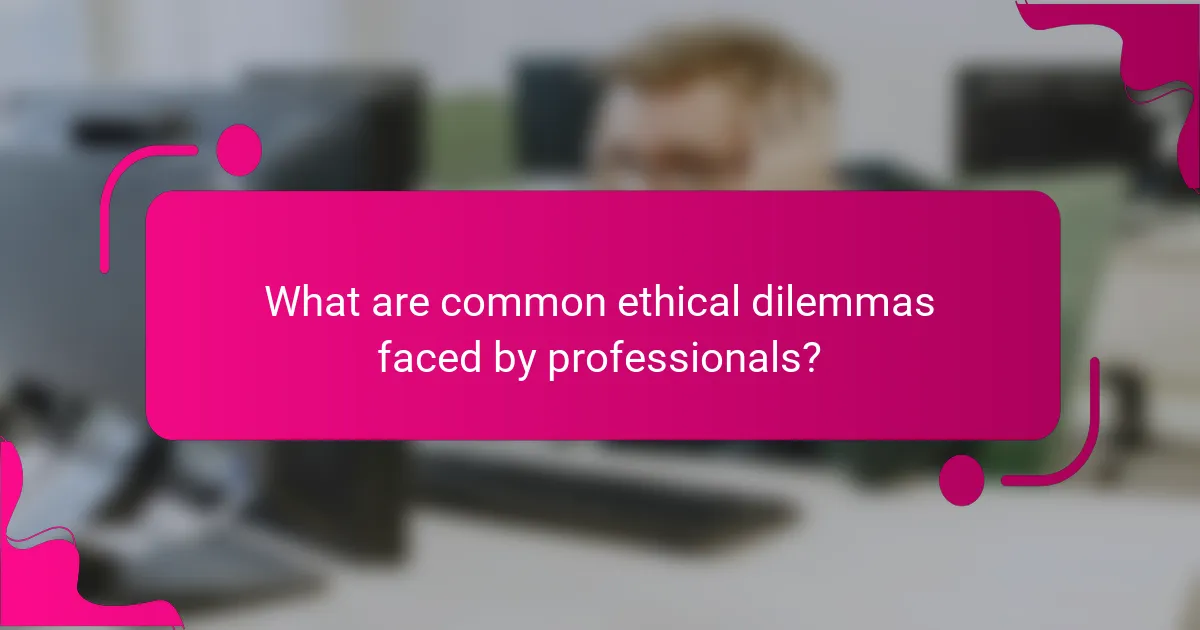
What are common ethical dilemmas faced by professionals?
Professionals often encounter ethical dilemmas that challenge their values and decision-making processes. Common dilemmas include conflicts of interest, whistleblowing, and data privacy issues, each requiring careful consideration and resolution strategies.
Conflicts of interest
Conflicts of interest arise when a professional’s personal interests potentially interfere with their obligations to their employer or clients. These situations can lead to biased decisions that may harm stakeholders or compromise integrity.
To navigate conflicts of interest, professionals should disclose any potential conflicts to relevant parties and seek guidance from ethical guidelines or legal standards. For instance, a financial advisor with personal investments in a recommended stock should inform clients to maintain transparency.
Whistleblowing
Whistleblowing involves reporting unethical or illegal activities within an organization, often putting the whistleblower at risk of retaliation. This ethical dilemma weighs the obligation to report against the potential personal and professional consequences.
Professionals considering whistleblowing should document evidence and understand their rights under laws such as the Whistleblower Protection Act in the U.S. It is crucial to assess the severity of the wrongdoing and the likelihood of effective action being taken.
Data privacy issues
Data privacy issues arise when professionals handle sensitive information, requiring them to balance the need for data use with the obligation to protect individuals’ privacy rights. This dilemma is particularly relevant in industries like healthcare and finance, where regulations such as GDPR in Europe impose strict data protection standards.
To address data privacy concerns, professionals should implement robust data management practices, including encryption and access controls. Regular training on data protection regulations can help ensure compliance and mitigate risks associated with data breaches.
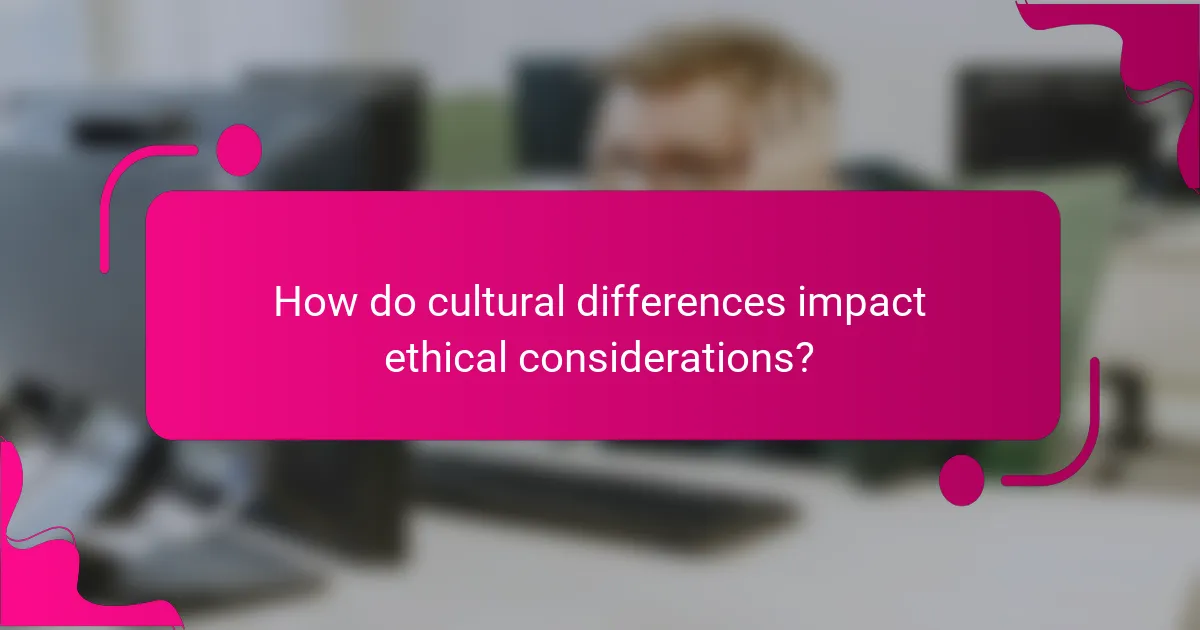
How do cultural differences impact ethical considerations?
Cultural differences significantly influence ethical considerations by shaping moral values, business practices, and communication styles. Understanding these variations is crucial for navigating ethical dilemmas in a globalized world.
Variations in moral values
Moral values can differ widely across cultures, affecting perceptions of right and wrong. For instance, collectivist societies may prioritize community welfare over individual rights, while individualistic cultures often emphasize personal freedom and autonomy. This divergence can lead to conflicting ethical viewpoints in international interactions.
When addressing ethical dilemmas, it’s essential to recognize these variations and consider how they might affect decision-making processes. Engaging with local stakeholders can provide insights into the prevailing moral values and help avoid misunderstandings.
Global business ethics
Global business ethics encompass the principles that guide ethical behavior in international commerce. Companies operating across borders must navigate different legal frameworks, cultural norms, and ethical expectations. For example, practices considered acceptable in one country may be viewed as unethical in another, such as gift-giving in business contexts.
To effectively manage ethical challenges in global business, organizations should establish clear ethical guidelines that respect local customs while maintaining core values. Training employees on cultural sensitivity and ethical standards can also help mitigate risks associated with cross-border operations.
Cross-cultural communication
Cross-cultural communication plays a vital role in addressing ethical dilemmas by facilitating understanding between diverse parties. Miscommunication can arise from language barriers, differing non-verbal cues, and varying interpretations of messages, potentially leading to ethical conflicts.
To enhance cross-cultural communication, individuals should practice active listening, be aware of cultural nuances, and adapt their communication styles accordingly. Utilizing tools such as cultural competence training can improve interactions and help resolve ethical issues more effectively.
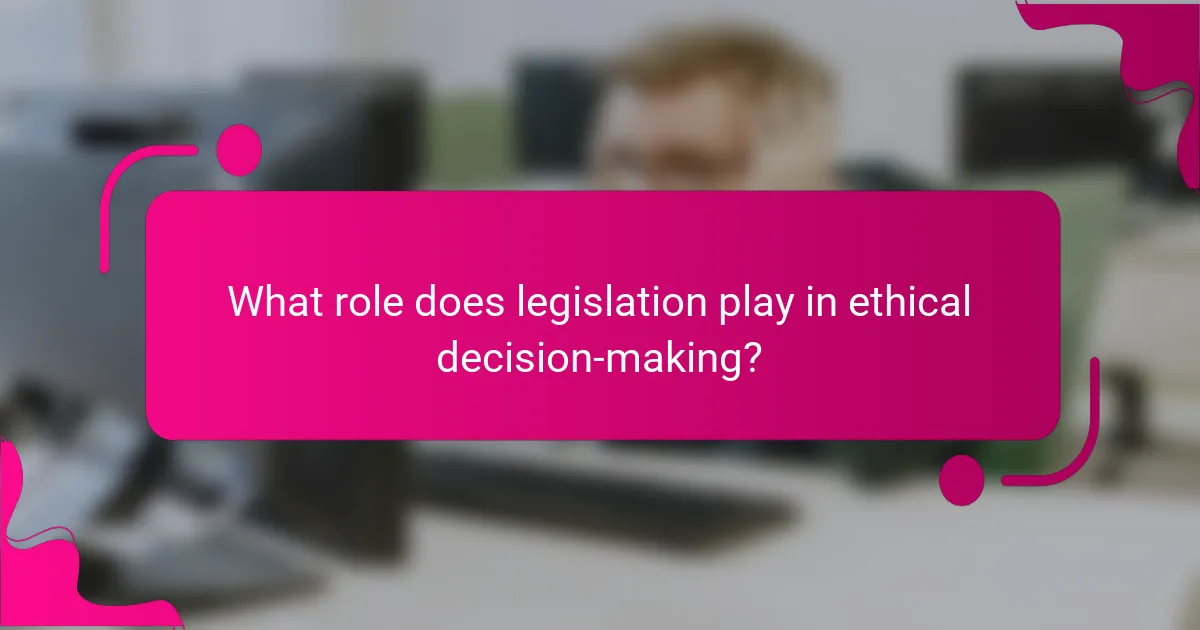
What role does legislation play in ethical decision-making?
Legislation serves as a critical framework for ethical decision-making by establishing the legal boundaries within which individuals and organizations must operate. It provides guidelines that help navigate complex ethical dilemmas, ensuring compliance and accountability.
Compliance with laws
Compliance with laws is essential for ethical decision-making, as it ensures that actions align with established legal standards. Organizations must regularly review relevant laws and regulations to avoid legal repercussions and maintain ethical integrity.
For instance, businesses in the European Union must adhere to the General Data Protection Regulation (GDPR), which governs data privacy and protection. Non-compliance can result in substantial fines, making it crucial for companies to implement robust data management practices.
To ensure compliance, organizations should conduct regular training sessions for employees, establish clear policies, and create a culture of accountability. Regular audits can also help identify potential legal risks and areas for improvement.
